Spanish Teen Rally is a film of genre Documentary
Spanish Teen Rally (2014)
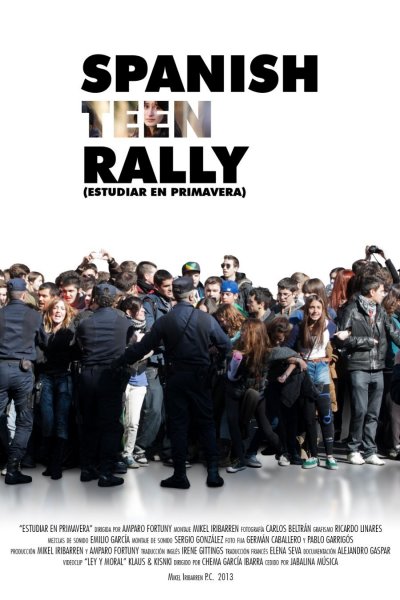
If you like this film, let us know!
Length 53minutes
Genres Documentary
Themes Films about education, Documentary films about law, Documentary films about historical events, Documentaire sur une personnalité, Documentary films about politics, Political films
Rating83%










Spanish Teen Rally is a 2014 Spanish documentary film directed by Amparo Fortuny. The film delves into the world of a group of teenagers whose protests in defense of Public Education triggered the so-called Valencian Spring. It was the very first experience of protest for many of them and lead to their crash with reality. Not only did these teenagers become the symbol of the student protests throughout Spain; they also became a reflection of the youth's disenchantment facing an uncertain future in a country where the austerity policies are beginning to seriously affect society.
In the documentary we find testimonials from students from 13 to 19 years of age with shocking images of the demonstrations together with foregrounds of the young protagonists enduring police charges and the destruction of children icons (dolls, balloons, cakes and confetti, etc..)
Comments
Leave comment :
Suggestions of similar film to Spanish Teen Rally
There are 8971 with the same cinematographic genres, 11115 films with the same themes (including 1 films with the same 6 themes than Spanish Teen Rally), to have finally 70 suggestions of similar films.If you liked Spanish Teen Rally, you will probably like those similar films :

A City Decides (1956)
, 27minutesDirected by Charles Guggenheim
Origin USA
Genres Documentary
Themes Films about education, Films about racism, Documentary films about racism, Documentary films about law, Documentary films about historical events, Documentaire sur une personnalité, Documentary films about politics, Political films
Rating64%






Son of al Qaeda (2004)
Origin Canada
Genres Documentary
Themes Films about terrorism, Documentary films about law, Documentary films about war, Documentary films about historical events, Documentaire sur une personnalité, Documentary films about politics, Documentary films about terrorism, Political films
Rating26%





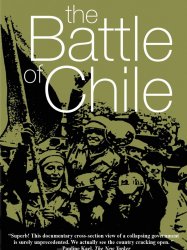
The Battle of Chile: Part I (1975)
Directed by Patricio Guzmán
Genres Documentary, Historical
Themes Seafaring films, Politique, Transport films, Documentary films about law, Documentary films about historical events, Documentaire sur une personnalité, Documentary films about politics, Political films, Films about Latin American military dictatorships
Rating80%





En 1973, alors que Salvador Allende initie un programme de transformations sociales et politiques visant à enrayer la pauvreté, la droite organise une série de grèves. Quand Allende obtient la majorité des suffrages en mars, la bourgeoisie comprend qu’elle ne peut plus avoir recours à des mécanismes légaux, et c’est le coup d’État.

Arab-Israeli Dialogue (1974)
, 40minutesDirected by Lionel Rogosin
Origin USA
Genres Documentary
Themes Films set in Africa, Films about religion, Documentary films about law, Documentary films about war, Documentary films about historical events, Documentaire sur une personnalité, Documentary films about politics, Documentary films about religion, Political films, Films about Jews and Judaism

The Order of Myths (2008)
, 1h19Origin USA
Genres Documentary
Themes Films about racism, Documentary films about racism, Documentary films about law, Documentary films about historical events, Documentaire sur une personnalité, Documentary films about politics, Political films
Rating68%






Terror's Advocate (2007)
, 2h15Directed by Barbet Schroeder
Origin France
Genres Documentary
Themes Films about terrorism, Documentary films about law, Documentary films about war, Documentary films about historical events, Documentaire sur une personnalité, Documentary films about politics, Documentary films about terrorism, Political films
Actors Barbet Schroeder
Rating70%





Jacques Vergès est né « colonisé » (selon ses propres termes) en 1925 à Ubone au Siam, dans l'actuelle Thaïlande(ou en 1924). Sa mère est vietnamienne et son père est réunionnais, consul de France au Siam au moment de sa naissance.
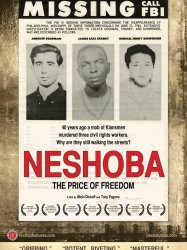
Neshoba (2010)
Genres Documentary
Themes Films about racism, Documentary films about racism, Documentary films about law, Documentary films about historical events, Documentaire sur une personnalité, Documentary films about politics, Political films
Rating76%





Neshoba explores the history and changing racial attitudes of Neshoba County, Mississippi four decades after the murders of James Chaney, Andrew Goodman, and Michael Schwerner during Freedom Summer. The film captures the trial of Edgar Ray Killen, who granted the filmmakers "extraordinary access".
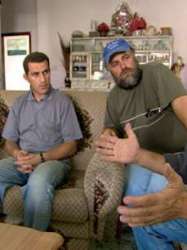
Another Side of Peace (2005)
, 1hGenres Documentary
Themes Films set in Africa, Films about religion, Documentary films about law, Documentary films about war, Documentary films about historical events, Documentaire sur une personnalité, Documentary films about politics, Documentary films about religion, Political films, Films about Jews and Judaism
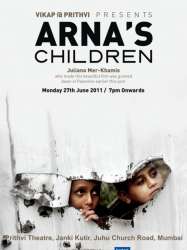
Arna's Children (2006)
Directed by Danniel Danniel, Juliano Mer-Khamis
Genres Documentary
Themes Films set in Africa, Films about religion, Documentary films about law, Documentary films about war, Documentary films about historical events, Documentaire sur une personnalité, Documentary films about politics, Documentary films about religion, Political films, Films about Jews and Judaism
Rating79%





Le documentaire raconte l’histoire de quelques jeunes combattants palestiniens de Jénine, dont certains ont été tués par les forces israéliennes. Enfants, ces jeunes faisaient partie d'une troupe théâtrale fondée par Arna Mer-Khamis, la mère du coréalisateur Juliano Mer Khamis.

Barricades (1969)
, 1h5Directed by Ram Loevy
Origin Israel
Genres Documentary
Themes Films set in Africa, Films about religion, Documentary films about law, Documentary films about war, Documentary films about historical events, Documentaire sur une personnalité, Documentary films about politics, Documentary films about religion, Political films, Films about Jews and Judaism
 Connection
Connection